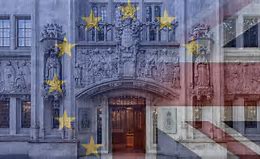By Ben Kerrigan-
A European Court hearing which will consider whether the UK can unilaterally revoke its Article 50 request to leave the EU.
The Supreme Court has rejected an appeal by the Government against a Scottish ruling which asked the Court of Justice of the EU (CJEU) to look at whether the UK can reverse the Brexit clause.
The case was sparked by a cross-party group of MPs, MEPs and MSPs, along with Jolyon Maugham QC, the director of the Good Law Project, had asked the Scottish courts to rule that the case should be referred to the CJEU in Luxembourg.
It is scheduled to be heard at the CJEU on November 27. Lawyers for the Department for Exiting the European Union (DExEU) had initiated today’s appeal in the Supreme Court.The Court of Session in Edinburgh had ruled in September to refer the question of whether Article 50 could be revoked to the CJEU after a case brought by the cross-party group of politicians. The British Government had presented an application to block the motion, but it was rejected.
PRELIMINARY
An appeal presented by the Secretary of State for Exiting the European Union appealing directly to the Supreme Court for permission to appeal was refused on Tuesday. The court said the Court of Session’s ruling was “preliminary” and it would still have to reach a judgment on the matter after the European Court has given guidance.
A statement issued by the Supreme Court said: “It is clear that this interlocutor did not constitute a final judgment.”
It continued: “As both this court and the CJEU have made clear, the preliminary ruling is merely a step in the proceedings pending before the national court – it is that court which must assume responsibility for the subsequent judicial decision.
“It will therefore remain for the Court of Session to give judgment in the light of the preliminary ruling, any relevant facts which it may find and any relevant rules of domestic law. It is only then that there will be a final judgment in the proceedings.”
The decision from Lord Carloway in September overturned an earlier ruling when it was said the question being asked was “hypothetical” and the conditions for a reference had not been met.
But Lord Carloway said it was “clear” MPs at Westminster would be required to vote on any Brexit deal agreed by the EU and the UK Government.
In his September judgment, Lord Carloway was clear the CJEU would not be advising Parliament on “what it must or ought to do”.
Instead, he said it would be “merely declaring the law as part of its central function”, adding that “how Parliament chooses to react to that declarator is entirely a matter for that institution”.

